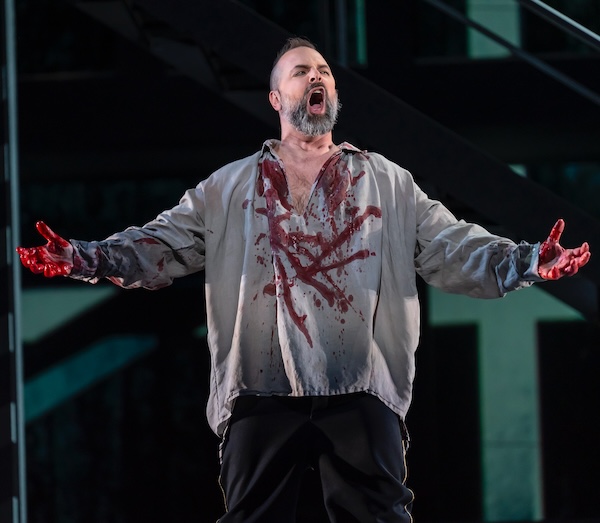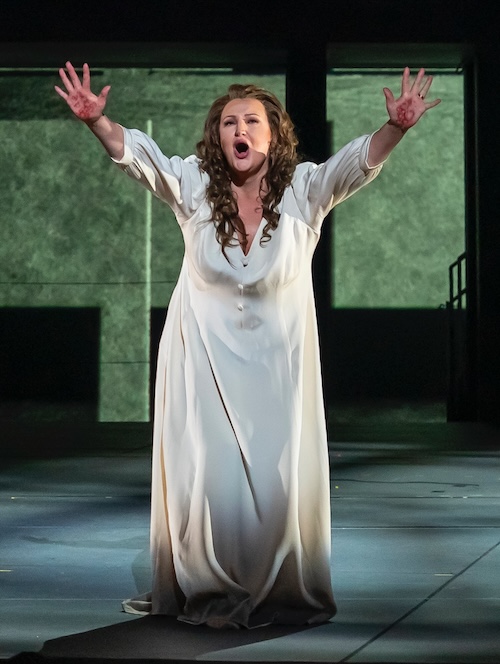WNO’s stellar cast shines brightly amid the eerie gloom of Verdi’s “Macbeth”

Étienne Dupuis stars in the title role of Verdi’s Macbeth at Washington National Opera. Photo: Scott Suchman
A bagpiper playing “Scotland the Brave” outside the Kennedy Center Opera House signaled the return of Giuseppe Verdi’s Macbeth to Washington National Opera Wednesday night. The company’s first production of the opera since 2007 (in the mostly 1865 revision), featured an exceptionally strong cast in a staging that took the opera’s supernatural and Scottish elements at face value.
Étienne Dupuis made his role debut as Macbeth, a worthy performance for his first appearance with WNO. The Quebec-born baritone deployed a brawny voice and stage presence to create a brutish version of the doomed thane. Yet Dupuis also brought vocal and emotional subtleties to his performance that revealed the character’s fears and self-doubt. His rendition certainly earned the restoration of Macbeth’s final aria “Mal per me che m’affidai,” sung while mortally wounded.
Ewa Płonka, building on a potent WNO debut last season as Turandot, proved equally powerful as Lady Macbeth. The Polish-American soprano’s top range soared resonantly to and above B-flat, and she had the agility to negotiate the more florid demands, as in the brindisi “Si colmi il calice.” Her acting was just as impressive, as with the pallid tone she brought to the haunted character for the sleepwalking scene. The singer’s confidence gave her a convincing dominance over her husband, until the moment of her mental unraveling.

Ewa Płonka is Lady Macbeth in WNO’s Macbeth. Photo: Scott Suchman
Tenor Kang Wang scored a mini-triumph as Macduff, a rare example of a Verdi tenor role that stays mostly in the background. His somewhat unsubtle delivery gave appropriate pathos to his single aria, the Act IV lament over his slain wife and children. Bass Soloman Howard added to a long list of WNO successes as a stentorian Banquo, his tall stature adding to his menacing presence as the blood-stained ghost.
WNO Cafritz Young Artists filled out the comprimario roles, led by the virile Malcolm of tenor Nicholas Huff. The three spirits who prophesied to Macbeth in Act III, baritone Jonathan Patton and sopranos Kresley Figueroa and Viviana Goodwin, sang through amplification, which heightened the eeriness of the scene but limited the ability to appreciate the character of their voices.
The WNO Chorus, under the leadership of Steven Gathman, sounded the most tightly prepared it has in some time. The women made an outstanding coven of witches, in the opera’s signature scenes in Acts I and III, with crisply coordinated ensemble precision and blood-curdling tone. The presence of four manic dancers enlivened their otherwise somewhat static staging. The chorus of Scottish exiles (“Patria oppressa”), with the full chorus, captured all the forlorn and angry feelings of a people oppressed by a tyrant.
Evan Rogister, who retains the title of principal conductor until the official opening of Robert Spano’s tenure as music director next fall, made a strong showing in his final production in that position. His ideas about the score, well-defined and dramatic, came across in his gestures, uniting pit and platform with few lapses. (Neither Spano nor Rogister will conduct either of the two remaining mainstage productions this season, both scheduled for the very end of the season in May.)
Brenna Corner, artistic director of Pacific Opera Victoria in British Columbia, directed this minimalist but dramatically effective staging, reminiscent of her previous work at WNO in Il Trovatore in 2022. She returned with the same production team, with basic set design by Erhard Rom. A framework of steel girders and staircases did not match with the overall 19th-century concept of the setting, suggested by the costumes cobbled together from various loani shops, but with swords for the battle scenes. Hanging strips of ragged, ghostly cloth added an otherworldly touch in the witch scenes.
Rather than sets or costumes, most of the production’s evocative strength came from AJ Guban’s light and S. Katy Tucker’s video projections. This included sickly green hues and curling smoke for the witches, projected on the strips of cloth and the hags’ costumes, as well as the visual component of the Act III apparitions. Moody videos, flashing quotations from the Shakespeare play, covered brief pauses for set changes.
Macbeth runs through November 23. kennedy-center.org

